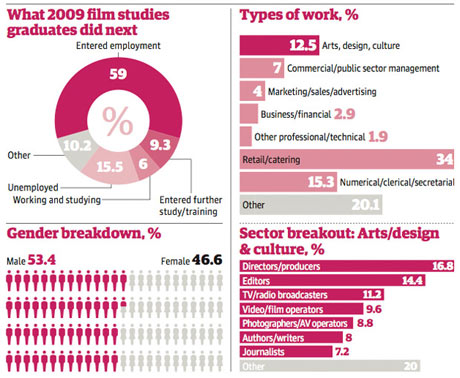The film industry is notoriously competitive, but graduates will have developed a highly transferable range of skills.
You don't need a film studies degree to be the next Alfred Hitchcock or Quentin Tarantino, but it could put you on the right path.
Film studies degrees offer the chance to gain hands-on experience of film-making and also touch on topics such as film history, theory and criticism. Students study everything from Hollywood blockbusters to art house movies, taking in screenwriting, critiquing and directing along the way.
Famous graduates include Paul WS Anderson, director of video game adaptation Mortal Kombat. Anderson graduated with a degree in film and literature from Warwick University and is also behind such box-office successes as Resident Evil and Alien vs. Predator.
What skills have you gained?
As well as practical film-making skills such as how to operate a camera and edit footage, you will have developed skills which will make you attractive to employers in a wide variety of fields. These include good research and communication skills, critical thinking, project management and the ability to organise your time effectively and work to deadlines.
What jobs can you do?
Almost 60% of film studies graduates went into full-time employment in 2009. Of those, 12.5% found jobs within the art/design/culture sector and, within the film industry itself, 2.1% became directors, 1.2% video/film recorder operators and 1.4% broadcasters. Some 34% found work in retail/catering, perhaps as a temporary measure and an indication of the competitive nature of the industry.
The focus of your degree is an important factor, says Margaret Holbrough of Graduate Prospects. "Careers within the film industry are fiercely competitive and opportunities to pursue a technical or practical career will depend on the graduate's experience and the content of the degree, and whether it focuses more on hands-on film production skills as opposed to the appreciation, analysis and interpretation of films and film genres," she says.
"Within the film, TV and video industries the roles may include film/video/television editor, camera operator, photographer, art director, TV or film producer or production assistant, runner, location/props manager or programme researcher.
"In addition, the publishing industry, including printed newspapers, magazines, online publications and websites, may offer opportunities to write about films as a journalist, content manager or editor, or to work in film and picture research and archiving."
Some business areas, such as advertising, marketing and communications, may also utilise the creative and analytical abilities of film studies graduates in roles such as art directors, account managers, copywriters and market researchers.
Teaching and lecturing are also potential career options and require a postgraduate teaching qualification.
Postgraduate study?
Of those who graduated in 2009, 6% went on to study for a higher qualification. There are many masters and postgraduate diploma courses available in film studies, providing an opportunity to specialise in areas such as scriptwriting, directing, producing and final editing. Some jobs require a postgraduate qualification, such as teaching or journalism. There is also the chance to do postgraduate research in film-making.

Data supplied by the Higher Education Careers Services Unit and Graduate Prospects
Source: The Guardian 2011

No comments:
Post a Comment